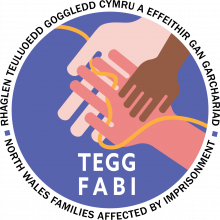Children face significant pressures and emotional upheaval when a family member is imprisoned.
When a family is affected by imprisonment:
- the family is more likely to experience poverty and debt, as well as feel stigmatised in their communities
- children tend to feel more isolated in schools and are more likely to face a range of poor outcomes, potentially leading to impoverished/damaging lives.
This also affects children and families who have a parent or family member involved elsewhere in the criminal justice system, not just in prison.
About the FABI Project
This project has been set up to raise awareness of the issues faced by families affected by imprisonment, as well as to encourage prevention work and more targeted, non-stigmatising, support.
The main aims of the FABI project are to:
- Create a formal system to identify children affected by parental imprisonment so that, systematically, they become a ‘visible’ group that can be better supported
- Help local services to better understand and address the health and wellbeing needs of children affected by parental imprisonment
- Help schools and other educational environments to provide better support to children affected by parental imprisonment
- Raise more awareness about the impact of parental imprisonment on children and families
Professionals – get involved with the project
If your work relates to this issue then please get in touch if you would like to support this project, or think you could help us develop the project.
We want to hear from you:
- If you collate figures on the numbers of children or families from North Wales affected by this issue
- If you have a specific understanding of the needs of families affected by imprisonment through the work that you do day-to-day
- If you provide support to families affected by imprisonment
- If you would like to understand more about this issue so you can provide support in future
Get in touch
Email: fabi@wrexham.gov.uk
Add your service to ‘Dewis Cymru’
If you provide a local service that can support children and families affected by imprisonment, we recommend that you add it to the Dewis Cymru website.
Dewis Cymru is a directory of local support services in Wales. Its purpose is to help people access local services in Wales and find the information they need to improve their own well-being.
More information and resources
You can also email fabi@wrexham.gov.uk to request previous copies of the FABI newsletter, as well as further resources and background information on this topic.

